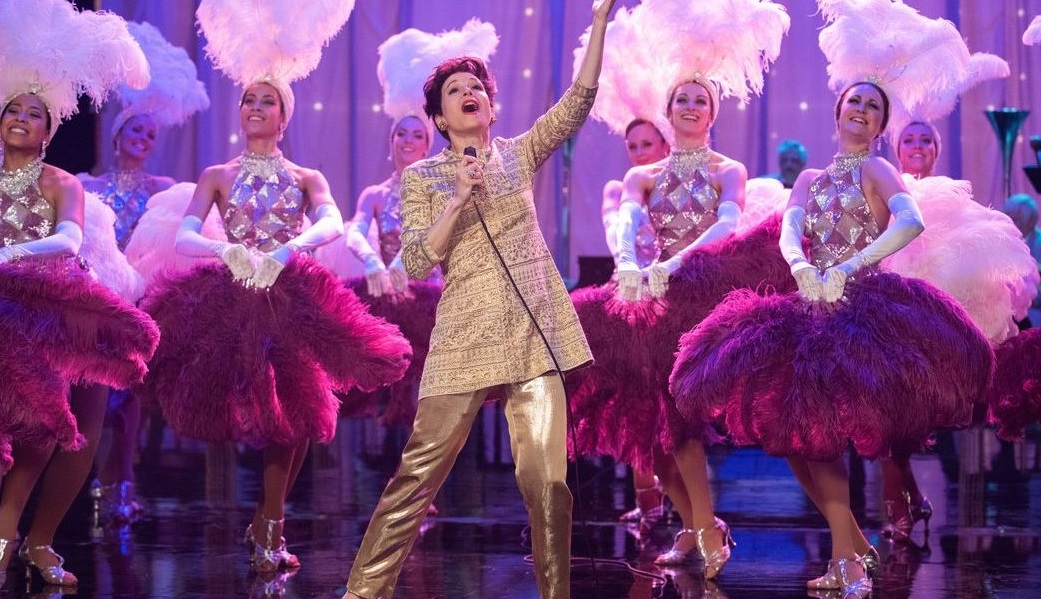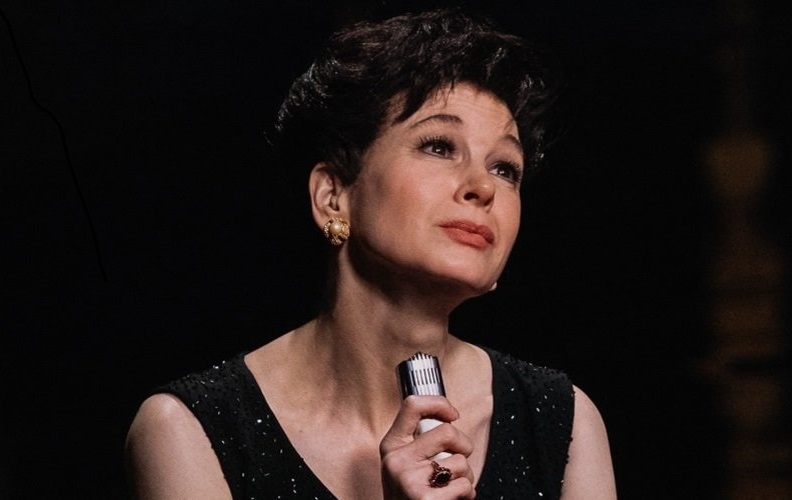CHICAGO – The Steppenwolf Theatre of Chicago continues to provide different viewpoints on the American stage, and their latest “Little Bear Ridge Road” is no exception. Featuring ensemble member Laurie Metcalf, it’s the resonate story of a family at the crossroads. For tickets/details, click LITTLE BEAR.
Zellweger's Star Power Single-Handedly Saves Stale 'Judy'
 Rating: 3.0/5.0 |
CHICAGO – Even before I figured out my own sexuality, Judy Garland’s status as a gay icon was known to me. I wouldn’t understand why until much later in my life, but sure as the sky was blue, the city was emerald, and the brick road was yellow, I knew I was a friend of Dorothy. Heartbreakingly, “Judy” paints a bleak portrait of the star, but never takes a look at the bigger picture.
For those not in the know about gay slang from the 1950s, a “friend of Dorothy” was a term used for LGBT people to discreetly identify each other during a time when homosexuality was illegal. The Dorothy referenced is, of course, Judy Garland’s fabulous character from “The Wizard of Oz”. Although the term has faded from use in the past few decades, Judy’s status as a cultural figure in the gay community remains as strong as ever. The most obvious reason the queer community identifies with her is because she knew what it was like to fight against an oppressive force that tried to dictate how she lived, looked, and behaved. In her case, the oppressor came in the form of MGM studio, and “Judy” would briefly examine how they are ultimately responsible for her death.

Photo credit: BBC Films
Don’t expect too much of a trip down memory lane since the scope examined in “Judy” only really extends to her final gig in London, which ended a few months just before her death. There are scattered flashbacks to the days of “Oz”, and a little bit of background setting to show how her financial desperation led her to the UK. The flashbacks briefly show how MGM head Louis B. Mayer (Richard Cordery) promised a young, impressionable Judy Garland stardom, but at the expensive of her childhood. As the story goes on, we see how during the various film shoots she would not be allowed to eat, sleep, or even celebrate her own birthday. Instead of food, she was given amphetamines; instead of sleeping when she was tired, she would be given drugs to make her sleep on command. The origins of every problem she suffered as an adult can be directly tied to a flashback, and that’s where the lack of storytelling nuance is the most noticeable.
Director Rupert Goold plays it safe in his approach, using conventional filmmaking techniques for a person who was known for breaking all conventions. For a film about larger-than-life Judy Garland, Goold treats her pretty basically. There is no showmanship or pizzazz, just a meat-and-potatoes biopic that takes the information about her past, connects the dots, and presents it to you straightforwardly as a cause and effect case. Goold’s interest seems to be more placed in using the beginning of her career and the end of it to tell a personal story, but so many important details get lost when you’re only using the bookends.
Tom Edge writes Judy into a corner, constantly bombarding us with obvious foreshadowing as to how the character will eventually die. Edge does a good job of highlighting Judy’s fierce maternal nature, which is one of the few ways the film does any sort of emotional development for the character. Where it sorely lacks is in developing the character beyond the tragic “A Star is Born” mold. The focus placed on her final engagement in London doesn’t do any justice to telling the story of Judy. Instead, it just comes off like another man trying to tell her story based only on her career and not the actual person. That means that “Judy” offers little new insight into her life, and you can find a better examination of it by just reading her Wikipedia page. There is a several-month gap in-between when the film ends and when she actually dies, and this time of her life would have probably been more worthy of the silver screen than the small-screen approach made in “Judy”.

Photo credit: BBC Films
There are still pleasant surprises to be had, but none based in fact. Edge creates two fictional gay characters, Dan and Stan (played by Andy Nyman and Daniel Cerqueira), who are meant to be composites created to represent the love the gay community had for Judy Garland. Even though their tender interactions never actually happened, and these queer characters were really only used as a way to cheaply develop Judy’s character, it was still a great fan-fiction addition to the film that went a long way to making Judy likable. Although she was never openly vocal about her support of same-sex couples, her action spoke for themselves as she used to frequently go to gay clubs and was friends with several openly gay people, so this interaction didn’t feel like a complete stretch.
The true reason to watch this film comes in the form of Renée Zellweger’s powerhouse performance as the later in life Judy Garland. Zellweger is the only poignant part of the entire production, capturing all the nuances and manifesting each of them. Even her singing becomes the perfect embodiment of Judy’s at that point in her life. Although the actress lacks the dynamic vocal range that Judy Garland had in her peak, it was more than up to the task of representing how decades of abuse had ravaged it. Best known as Bridget Jones, a star is reborn in this film and her name is Renée.
 | By JON ESPINO |


